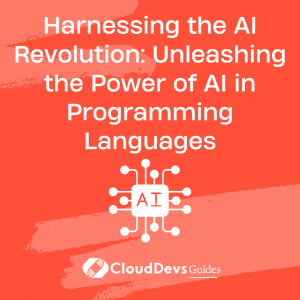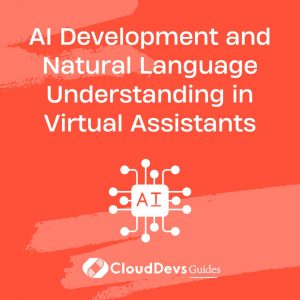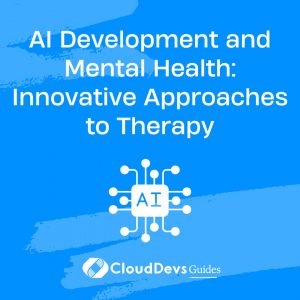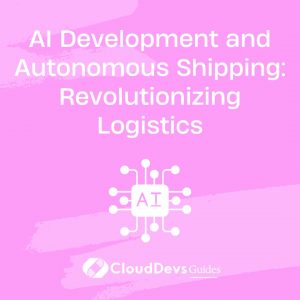Harnessing the AI Revolution: Unleashing the Power of AI in Programming Languages
Artificial Intelligence (AI) has emerged as a transformative technology across various industries, and programming languages have not been left untouched by its influence. AI is revolutionizing the way we write, optimize, and debug code, enhancing developer productivity, and enabling the creation of sophisticated applications. In this blog post, we will delve into the power of AI in programming languages, exploring its applications, benefits, and providing real-world examples of how AI is reshaping the programming landscape. Additionally, we’ll discuss how hiring AI developers can further leverage this transformative technology to drive innovation and success in software development.
1. Intelligent Code Completion:
One of the most tangible applications of AI in programming languages is intelligent code completion. AI-powered code editors and integrated development environments (IDEs) leverage machine learning algorithms to analyze the context and suggest code snippets, variable names, and even entire functions. This assists developers in writing code faster and with fewer errors. Examples of popular AI-powered code completion tools include Tabnine, Kite, and Microsoft’s IntelliSense.
2. Bug Detection and Automatic Debugging:
AI is making debugging more efficient by automatically detecting and fixing bugs in code. Deep learning algorithms are trained on large code repositories to identify common patterns and anomalies that may lead to bugs. Tools like DeepCode, CodeSonar, and Snyk use AI to analyze code and provide suggestions for bug fixes, enhancing the reliability and stability of software applications.
3. Natural Language Processing (NLP) for Code:
Natural Language Processing (NLP) techniques are being applied to bridge the gap between human language and programming languages. AI-powered tools, such as OpenAI’s Codex, can understand and generate code from natural language descriptions. Developers can describe their intentions in plain English, and the AI model translates it into code. This simplifies the process of programming and enables non-programmers to interact with code more easily.
4. Code Optimization:
AI techniques, including the ability to hire AI developers, are increasingly used to optimize code for better performance, efficiency, and resource utilization. Machine learning algorithms can analyze codebases, identify bottlenecks, and suggest optimizations, such as algorithmic improvements or parallelization techniques. For example, the AI-powered compiler developed by Intel, called Intel’s Machine Inferred Code Similarity (MISIM), can automatically optimize code by transforming it into more efficient versions. By harnessing the expertise of AI developers, organizations can unlock the full potential of AI technologies and drive significant improvements in code optimization and overall software performance.
5. Predictive Analytics for Software Development:
AI-powered predictive analytics tools are helping developers gain insights into software development processes and make informed decisions. By analyzing historical data, these tools can predict code quality, estimate development time, and identify potential risks. For instance, Microsoft’s Visual Studio IntelliCode uses machine learning to provide context-aware suggestions and predict code completion options based on patterns learned from similar code snippets.
6. Automated Testing and Quality Assurance:
AI is transforming software testing by automating various aspects of the testing process. AI models can generate test cases, automatically detect and prioritize test scenarios, and even perform regression testing. Tools like Diffblue and DeepTest leverage AI algorithms to automatically generate tests and verify the correctness of code changes, reducing the effort required for testing and enhancing the overall quality of software applications.
7. Predictive Maintenance and Error Prevention:
AI is being employed to predict and prevent errors in software applications. By analyzing patterns in code and runtime data, AI models can identify potential vulnerabilities, performance bottlenecks, and security risks. Tools like DeepCode and SonarQube leverage AI algorithms to provide real-time feedback on code quality and suggest preventive measures, allowing developers to proactively address issues before they manifest in production.
8. Automated Documentation Generation:
Documentation is an essential aspect of software development, but it can be time-consuming and often neglected. AI-powered tools are automating the process of generating documentation by extracting information from code, comments, and external resources. Natural language generation techniques are then employed to transform this data into comprehensive and easily understandable documentation. Tools like Sphinx and Doxygen utilize AI to automatically generate API documentation, reducing the manual effort required and ensuring up-to-date documentation.
9. Intelligent Code Refactoring:
Refactoring code is a common practice to improve readability, maintainability, and performance. AI is increasingly being utilized to automate and enhance the code refactoring process. Machine learning algorithms can analyze codebases, detect code smells and anti-patterns, and suggest refactoring techniques. JetBrains’ IntelliJ IDEA and Microsoft’s Refactoring Essentials are examples of AI-powered tools that assist developers in making code improvements, resulting in cleaner and more efficient codebases.
10. Automated Deployment and DevOps:
AI, including the ability to hire AI developers, is revolutionizing the deployment process and enhancing the field of DevOps. AI-powered systems, when guided by skilled AI developers, can analyze code, infrastructure, and historical data to optimize deployment strategies, detect potential risks, and automate deployment pipelines. Tools like Google’s Kubernetes Engine (GKE) and Amazon’s AWS CodePipeline leverage AI to streamline the deployment process, improving scalability, reliability, and reducing downtime. By harnessing the expertise of AI developers, organizations can unlock the full potential of AI technologies in DevOps, enabling seamless and efficient deployment of software applications.
Conclusion:
The power of AI in programming languages is evident from the numerous applications and benefits it offers to developers and software development teams. From intelligent code completion to automated testing, AI is streamlining the programming process, improving productivity, and enabling the development of more reliable and efficient software applications. As AI continues to evolve, we can expect even more sophisticated AI-powered tools and techniques to transform the way we write, optimize, and maintain code. Embracing AI in programming languages empowers developers, including the ability to hire AI developers, to focus more on creativity and innovation, propelling the field of software development into new frontiers.
Table of Contents









